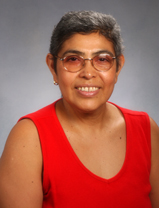 Name: Margarita Dinora Hernandez Name: Margarita Dinora Hernandez
Home State: Maryland
Margarita has been participating in cancer research since 2003
Why? Margarita knew that her best chance of surviving stage IV lymphoma was to register for a clinical trial targeted to her specific type of lymphoma.
Margarita
's story:
Margarita began having stomach pains in April 2003 and assumed the cause was stress or something she ate. But the pains persisted, her normally high energy flagged, and she knew she needed to see a doctor.
Margarita is a hard-working Salvadoran immigrant, a healthy woman who takes good care of herself and who counted on getting through life without medical insurance. Concerned clients persuaded her to see a specialist, despite the expense. An endoscopy recommended by the specialist showed a possible ulcer or stomach cancer. A biopsy and CT scan revealed that she had advanced lymphoma, a cancer of the circulatory system, which had spread beyond the system where it originated. Margarita was stunned.
Another client of Margarita's learned that the National Cancer Institute was running a clinical trial for a refinement of a treatment that had been successful with diffuse large B-cell lymphoma, the kind Margarita had. Within a week, Margarita was enrolled in the study.
Four decades earlier such a diagnosis would have been a death sentence. Neither surgery nor radiation - the only treatments known to be effective against cancer in those days - worked in a cancer that spread through the lymph system. And the cancer researchers who had pioneered in combination chemotherapy in the NIH Clinical Center in the 1960s had at first been vilified as "poison doctors," for offering fatally ill patients a combination of toxins that produced terrible side effects. But some of those patients who underwent early chemotherapy trials began to survive, and chemotherapy is now accepted treatment for many forms of cancer. Oncologists today know that Margarita's type of lymphoma, though aggressive, usually responds well to chemotherapy.
Luckily for Margarita, knowledge of cancer has deepened and cancer researchers today can target a treatment to a specific type of cancer. They can identify, for example, several distinct types of B-cell lymphoma, whose tumor cells might look similar but whose "molecular engines" work differently - which is why one lymphoma patient might respond differently to a particular treatment than another. The doctor in charge of Margarita's protocol explained that her prescribed regimen represents a new generation of treatment for aggressive B-cell lymphomas.
Margarita went through 6 months of intensive combination chemotherapy, most of it on an outpatient basis, with occasional stays in the NIH Clinical Center hospital so doctors could monitor such procedures as the initial administration of monoclonal antibodies. Two years after Margarita's final treatment, scans show her body to be clear of cancer.
"I thank God for this miracle," said Margarita. "For the first time in my life I saw doctors who actually listened to me and took the time to answer all my questions - and I had a lot of them. I trust the NIH. I got the best possible care there."
Read more stories
|